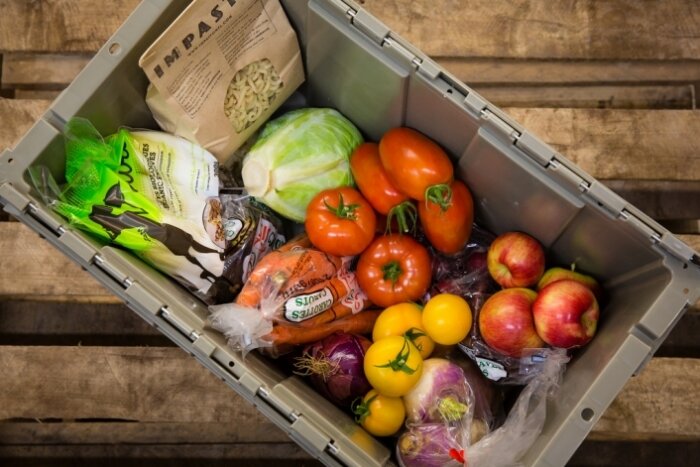Hey folks!
I hope you’re doing your best to crawl toward the end of the universally-hated 2020. In today’s article, I'm addressing a fun, yet challenging topic and allll of the nuances that come along with it: eating sustainably during COVID-19.
So much has changed about our lifestyles as a result of the pandemic. When it comes to our sustainable habits, the same is definitely true. Don't believe me? Well, would you still be comfortable using a restaurant’s reusable utensils right now? Or, have you been buying just a little more takeout than usual?
Photo by Any Lane on Pexels.com
We’re in a whole new world now, and taking care of yourself and those around you has to be your top priority. That means everything else may go out of focus for a little while.
But many of us will still want to be as sustainable as possible during this time -- if not even more so, since the climate crisis feels even more pressing. So, what might that look like right now? In this article, I’ll provide my approach to sustainable eating during COVID through each of the three realms of sustainability (social, environmental, and economic), backing it all up with tangible and direct resources you can use today.
So, without further ado, let’s dive in.
social sustainability
When it comes to social sustainability, we primarily think about people. We think about things like the treatment of marginalized groups within society, equity, diversity, and workers’ rights. Although many think the pandemic has had an equivalent effect on everyone, the research makes it clear that COVID-19 has disproportionately impacted marginalized communities. For example, more Black people get infected with and die from the virus, and many people in lower income brackets are also the ones working essential service jobs.
As such, there’s a huge role to play when it comes to socially sustainable food. Mainly, it looks like supporting restaurants, brands, and practices that seek to support marginalized groups and workers. You could consider donating your money to funds that combat food insecurity and provide relief to restaurants and food industry workers. Montreal Eater has a big list of those resources here. If you’re at McGill or in Montreal, you should also consider checking out Meals for Milton-Parc and the Montreal Student Initiative for Covid-19 Response and Relief.
Above is a recent post from Meals For Milton-Parc’s Instagram page! It gives a description about what this amazing, student-led organization is doing to support food sovereignty and security in Milton-Parc, a community near the McGill campus that is home to a group of houseless folks.
Moreover, this time is an excuse (in my opinion…) to eat out more. It’s a great excuse to take a break from cooking, and it directly assists restaurants, who are greatly in need of our support right now. You might consider specifically supporting BIPOC-owned restaurants. Cult MTL, for example, has a big Montreal-based list of Black-owned establishments. As well, when eating out, you might wish to go physically pick up your order or to contact the restaurant directly, because delivery apps take a pretty large cut of the restaurants’ earnings (as much as 25-30%!).
economic sustainability
Many people don’t totally get the term ‘economic sustainability’, which is fair since our mainstream conceptions of environmentalism seem to argue that financial systems are the root causes of climate injustice. While the aforementioned is pretty true, that doesn’t mean we can’t still use our money to fight for good (just look at the huge list of ways you can do so above)! Economic sustainability refers to the ways in which we can support “good economic growth” — that is, growth which doesn’t hurt the earth or its people.
The main way you can practice economic sustainability is by shopping locally! And the good news is, that’s pretty easy nowadays. COVID has influenced most brands to create online shops, meaning you don’t have a reason to support giants like Amazon anymore.
This photo shows two individuals shopping at a store (wearing their masks, of course!)
Photo by Anna Tarazevich on Pexels.com
There are also so many incredible local businesses and restaurants, wherever you are — it’s up to you to check them out! To start you off, this article has lists for every part of Canada. And as we are in the holiday season, you can use your gift shopping to introduce your friends and family to all the amazing new establishments you’ve discovered recently.
Also, consider looking for products at your local stores which have the Fairtrade label! Fairtrade is an ethics standard that certifies the fair treatment of all workers in the supply chain. From experience, the products also taste absolutely delicious because they’ve been made with care, by people who were paid ethically and treated the way they should be.
environmental sustainability
A very aesthetic reusable bag photo…which you can replicate by bringing your OWN tote bag to the grocery store to be sustainable!
Photo by cottonbro on Pexels.com
Finally, environmental sustainability refers to the obvious: protecting the planet’s natural resources through our every action. As I mentioned at the beginning of the article, many of our typical individualistic environmental efforts have been compromised somewhat by the pandemic — taking our own containers and reusable cups to the restaurant or cafe doesn’t feel as safe anymore. For my part, my takeout consumption has also increased by a lot. On the positive, at least, many of us are travelling a lot less due to the rapid implementation of stay-at-home orders. This is great for reductions in our transportation-based carbon footprint.
But when it comes to fighting back against environmental degradation during the pandemic through our food choices, there are numerous actions we can take! As I somewhat mentioned previously, if you’re ordering takeout, consider going to pick it up in-person (at least if it’s walkable). Doing so will save a carbon footprint-inducing car trip for someone else. You can also request that your restaurant leave out the single-use utensils and napkins so as to avoid that extra bit of waste. Moreover, taking your reusable bags to the grocery store is still safe, so keep doing that!
You might also consider buying more of your groceries locally, meaning both travelling to small, local shops as well as selecting products grown/produced nearby! Practicing both of these techniques will help reduce your food miles, a concept that argues in favour of reducing your culinary carbon footprint. It’s hard to know the exacts when it comes to this topic, and there’s lots of nuance, but it’s a good starting point. Finally, if you’re located in Quebec, you could check out Lufa Farms, which is a local foods delivery service.
a Lufa Farms fresh produce basket! Consider ordering from Lufa Farms for safety, convenience, and sustainability.
Source
conclusion
Well, there you have it! A rundown of many of the ways in which you can eat sustainably during the COVID-19 pandemic. Stay calm, take care of yourself, and do your best — there’s lots we can all do, but don’t get overwhelmed trying to tackle everything at once.
As a final plug, I want to share an article I wrote for a project that I did this past spring in another class. I believe it ties together all of the pillars of food sustainability in a meaningful way. Check it out here; I hope you enjoy it! Let me know in the comments what else you’re doing to stay sustainable during the Coronavirus!
with love and sustainability,
– ethigirl :)







